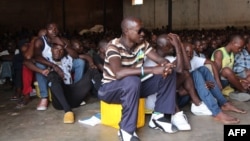Rwanda is unlawfully locking up beggars, sex workers and homeless people to clean up the image of its capital, Human Rights Watch said on Thursday, in a report dismissed by the government.
Officials said drug addicts and other people were held only briefly in a transit center before going on to rehabilitation programs. They denied breaking local or international laws.
The New York-based rights group said thousands of people had been detained for up to several months without charge in "deplorable" and "filthy" conditions at the Gikondo Transit Center in Kigali.
"The arbitrary detention ... reflects an unofficial policy of keeping people the authorities consider 'undesirable' away from the public eye," it added, citing research including interviews with 57 former detainees.
"Kigali is often praised for its cleanliness and tidiness, but its poorest residents have been paying the price for this positive image," said Daniel Bekele, HRW's Africa director.
Not a detention center
Rwanda's justice minister, Johnston Busingye, released a statement saying Gikondo was not a detention center.
"It is a transit center and people are held there for a short period before longer term remedial or corrective measures are taken," he added, without saying how long people stayed, or whether their involvement was voluntary.
More than 7,000 Rwandans had completed the program and were now working in carpentry, masonry, welding, tailoring, and bee-keeping, "improving their wellbeing for a brighter future," he added.
President Paul Kagame has won praise for the economic progress the east African nation has made since the 1994 genocide when 800,000 mostly Tutsis and moderate Hutus were killed.
His critics accuse him of cracking down on dissent, a charge he dismisses.




